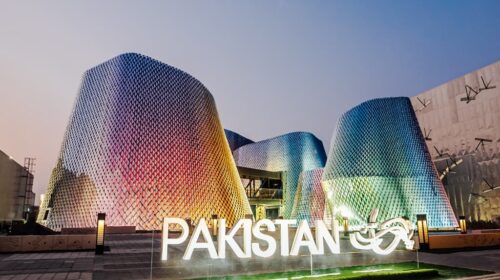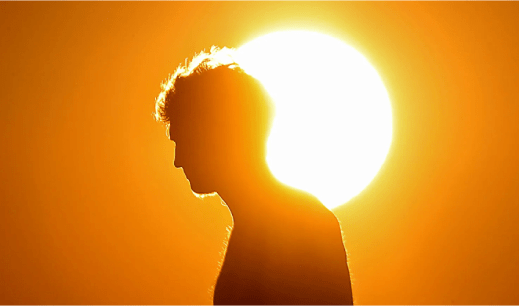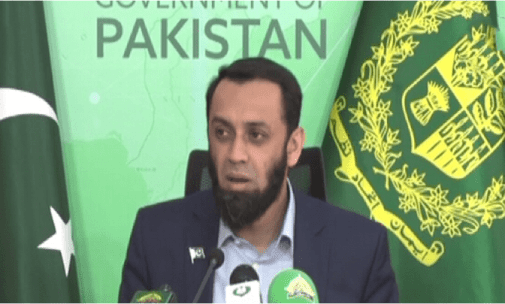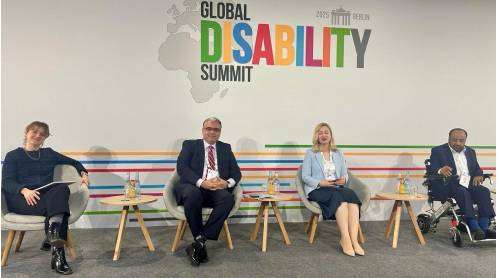At the sprawling Expo 2020 Dubai, a cultural tour de force known as the Pakistan Pavilion has been quietly drawing global attention. It is among the pièces de résistance of the Opportunity District – a fitting location for a country that shows great promise as a magnet for tourists and investors.
Themed as ‘Pakistan: The Hidden Treasure’, the pavilion cost $28.72 million to build and spreads across 35,000 square feet.
“Through this theme, we’re not only highlighting our potential in terms of the tourism industry but also showcasing its people and economic and industrial prowess,” Rizwan Tariq, Director of Pakistan Pavilion at Expo 2020 Dubai, and Director General Trade Development Authority of Pakistan (TDAP), told Business Recorder.
Just two months into Expo 2020, which runs until March 31, 2022, the Pakistan Pavilion has emerged as one of the most visited spaces out of the 192 participating countries – unsurprising as its glistening façade by coveted artist Rashid Rana compels you to stop in your tracks.
“With its shining and colorful façade that’s shaped after the mountain ranges of Pakistan, the Pavilion exhibits the vibrancy and buoyancy of Pakistani culture and the liveliness of Expo 2020,” said Afzaal Mahmood, Ambassador of Pakistan to the United Arab Emirates.
Inside, the cultural vocabulary of over 7,000-year-old civilisations that Pakistan has inherited comes to life, with the multisensorial journey charting the country’s rich past and present, whilst setting the tone for the future. “The Pakistan Pavilion showcases different cultures, traditions, religions and people who have inhabited this land,” notes Mahmood.
TDAP, the executive agency behind the project, put together the curatorial team for the Pakistan Pavilion, which comprises ‘creatives’ the likes of Noorjehan Bilgrami as principal curator and interior architect Shahid Abdulla. “Mrs. Bilgrami and the team have done a marvelous job of showcasing the history, culture, crafts, landscapes and opportunities that Pakistan presents,” shares Tariq. “I often tell visitors that other pavilions may be showcasing technology to highlight their progress, but we’re presenting culture, history and tourism through technology. We’ve incorporated technology into the showcases to depict the country’s gems that are often overlooked.”
Among the key goals of the Pakistan Pavilion is to bolster the country’s trade with a special focus on industries like textile that contribute more than 60% to its total exports.
“The government is promoting special economic zones and offering incentives to individual investors and several Chinese companies have already started launching textile factories in Pakistan,” said Tariq. This holds true in light of recent developments, like the Shanghai-based company Challenge investing $150 million in an industrial park on Lahore’s border with Kasur earlier this year, which will house state-of-the-art fabric units, dyeing facilities and garment manufacturing units.
“We’re collaborating with the Pakistan Textile Council and holding three interactive sessions with them from 28-30 November.
“At the Pakistan Pavilion, we’re telling the world that our country has competitive skilled labor and efficient energy resources. That’s how we plan on bringing maximum investment into the sector and also improving textile products,” according to Tariq.
Tariq said that other priority areas include industrial sectors like housing and construction, which can funnel direct investment into the country. Also, at the core of the Pakistan Pavilion is to position the country as a safe tourist destination.
“The space brings to life the diversity of Pakistan’s natural landscapes, flora and fauna, and peaceful coexistence of different cultures and religions. We want to show the real face of Pakistan to the world. We want people to come and see a glimpse of the hidden treasures of Pakistan at Expo 2020 and then visit the country and experience them,” notes Mahmood.
The Pakistan Pavilion has also been an avenue for fostering the country’s longstanding association with the UAE.
Through its presence at Expo 2020, Pakistan has sent a message that we share the success and happiness of our brotherly country UAE,” says Mahmood. “The founding fathers of the UAE, especially the late Sheikh Zayed bin Sultan Al Nahyan, had a special love for Pakistan. With projection of our diversity at the Pavilion, we’re connecting with the younger generation of Emirati leadership. We’re showcasing what the real Pakistan is. The Pavilion has been successful in projecting the true image of the country,” he adds.
Meanwhile, Tariq was also appreciative of the UAE government for their support.
“We’re the second-largest expat community in the UAE and the country is also one of our largest trading partners. This year, we’re celebrating 50 years of brotherhood, as the UAE marks its golden jubilee,” states Tariq. “I’d like to thank their government, which has been incredibly supportive of Pakistan’s participation at Expo 2020. Our private sector also values the countries’ bilateral relations and has contributed generously in terms of sponsorships and donations.”
Since its opening, the Pakistan Pavilion has been visited by a few members of the Emirati royal family and the government, such as His Excellency Ahmed Ali Al Sayegh, Minister of State in the UAE. “The journey at the Pakistan Pavilion starts with the façade and the royal family and leadership have been greatly impressed with it. It’s truly one of a kind. Rashid Rana has transformed architecture into art and that’s where they get to see the craftsmanship and skills of our people,” says Tariq.
The Pakistan Pavilion has dedicated one month to each province, so visitors can relish their distinct cultures, and economic and investment opportunities through a string of activities, performances and workshops. So far, Balochistan and Punjab have displayed their varied offerings and coming up next are Sindh, Khyber Pakhtunkhwa, Gilgit-Baltistan and Azad Kashmir.
To satiate food enthusiasts and shoppers, the Pavilion houses The Dhabba with sumptuous local cuisines, and a souvenir shop called Bazaar, offering artisanal creations. A fine-dining restaurant named Dawat has also recently opened its doors with a scenic rooftop setup at the Pavilion. “I invite everyone who hasn’t visited yet to come and see for yourself the richness and diversity of Pakistan, all exhibited under one roof,” says Mahmood.







